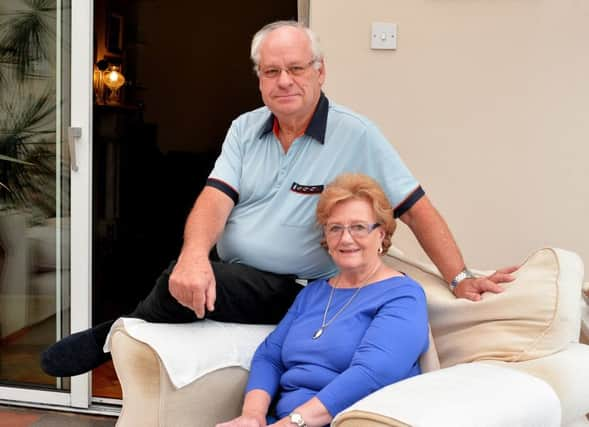'˜Let your loved ones know your wishes' says Derry man who donated kidney to wife


Joe McMonagle, who donated a kidney to his wife of 47 years, Carmel, five years ago, said that organ donation is a ‘true gift of life’.
Carmel spent years on dialysis after she was diagnosed with cancer and had both kidneys removed.
Advertisement
Hide AdAdvertisement
Hide AdJoe and Carmel said organ donation was something they had never thought about or talked about until ‘it came to our door’.
In the last number of years, they have been campaigning to raise awareness of organ donation through their work with the Altnagelvin Renal Support Group.
Carmel was diagnosed with cancer in 2005 and had one and a half kidneys removed.
A year later the cancer returned and she had to have further surgery to remove the remaining half of her kidney and her spleen. A transplant was not possible until Carmel had been cancer free for five years.
Advertisement
Hide AdAdvertisement
Hide AdThe former St Patrick’s Primary School secretary had to give up work as a result of her diagnosis.
“I was put on dialysis right away, four hourly sessions three times a week and it was tough, but it kept me alive. For the first three months I had to be careful where I went because my immune system was very low.”
Carmel also had to follow a strict diet and had a restricted fluid intake of 600ml of day, which included all liquids.
“You think how am I ever going to do it, but you do it because you have to and you do become accustomed to it. Dialysis left me feeling very tired as well, I would always have to sleep afterwards.”
Advertisement
Hide AdAdvertisement
Hide AdJoe recalls one experience that made him realise how big an impact the restricted diet and fluid intake had on Carmel.
“We would go to Rathmullan and one summer’s day we were sitting on a bench when Carmel said she was jealous of this couple in the distance. I couldn’t figure out why until she said they were drinking water.
“That is how restrictive it was. I thought how can you be jealous of someone drinking water, it is such a simple thing. But Carmel couldn’t just drink water out of a bottle. That really shocked me and brought home how bad it was.”
Going to the hospital three days a week meant that Carmel and Joe, who had just retired from his job as a director of Coolkeeragh Power Plant, essentially lost those days.
Advertisement
Hide AdAdvertisement
Hide AdAfter a year, Carmel was offered the opportunity of home dialysis and this gave the couple more freedom.
“We worked as a team and made dialysis suit our lifestyle rather than have our life built around dialysis.”
Carmel remained on dialysis for eight years before her medical team began getting her ready for transplant.
Joe said it is ‘very unusual’ for a husband to donate an organ to a wife, or indeed vice versa, but it was something he was always prepared to do.
Advertisement
Hide AdAdvertisement
Hide Ad“It is normally siblings or children. We have one son, but he had his whole life ahead of him. So we were prepared to go into a paired donation scheme if I was not a match.”
Joe underwent extensive tests to see if he was compatible and while they were not an exact match the medical team ‘were able to work with it’.
“All the potential hazards and dangers were explained to me, but the benefits to Carmel outweighed any risk to me. The transplant was a way of getting our life back and not having to have dialysis.”
Joe told the ‘Journal’ the north should be ‘incredibly proud’ of it’s live donor rate. However, he said the rate of organ donation after death needs to improve.
Advertisement
Hide AdAdvertisement
Hide AdHe said he was disappointed an opt-out scheme was not adopted in Northern Ireland as the statistics for organ donation after death remain ‘horrendous’.
“Around 15 people die each year waiting on a transplant and they are needless deaths. One organ donor can save seven lives and can improve the lives of nine. Organ donation gives life, saves life and changes life.”
“Only 43% of people in Northern Ireland have signed the organ donor register. Even if you have signed the register the final decision is made by family members and around 30-40 per cent of their families refuse at the time of death.”
Joe encouraged others to talk about organ donation and inform loved ones about your wishes.
Advertisement
Hide AdAdvertisement
Hide Ad“Making a decision about organ donation at the time of death is very, very hard to do. The people who do it are very brave, but please make it easier for your family by letting them know your wishes.”